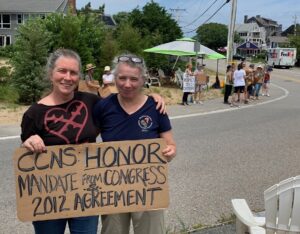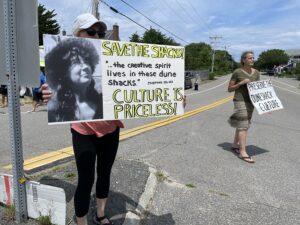PROVINCETOWN — The select board has asked Cape Cod National Seashore Supt. Brian Carlstrom to bring in professional mediators to help with ongoing controversies over the Dune Shacks of Peaked Hill Bars, on the Outer Cape’s windswept Atlantic shore.

“Although the NPS’s stated commitment to follow the Use Plan is clear, there is broad misunderstanding and disagreement regarding the execution of the plan,” the select board wrote in a letter sent to Park Service officials on Aug. 14 and referring to the Dune Shacks Historic District Preservation and Use Plan signed in 2012.
“There has been a lack of dialogue with NPS,” the letter continued. “We all have not had the opportunity to understand how the NPS is interpreting and executing the terms of the agreed-upon Plan…. We believe a facilitated dialogue will increase public understanding of the NPS’s decision making and promote cooperation between the Park Service, the dune dwellers, and the larger Provincetown community.”
The letter was addressed to Carlstrom and was also sent to NPS Director Charles Sams; Assistant Secretary of the Interior Shannon Estenoz; and William Hall, director of the Interior’s Office of Collaborative Action and Dispute Resolution; along with Truro’s select board and state lawmakers.
That same day, Aug. 14, the Park Service sent letters to the families who have long held leases on eight dune shacks that are part of the public leasing contest the agency announced on May 1.
“The RFP evaluation panel is well underway,” wrote Joan Horgan of the National Seashore leasing team, “but it appears they will not be able to complete all selections by the originally anticipated date” at the end of August.
Those families had originally been told to be ready to vacate their shacks on Sept. 2 if they did not win a 10-year lease. Now they have until Oct. 31, on the condition that they allow the NPS and winners of new leases to arrange site visits during October.
Janet Armstrong, who received a notice-to-quit letter in June requiring her to leave her family’s shack in early September, also received an update from the Park Service last week. Carlstrom called to offer her a one-year special use permit for the Armstrong shack, which is not currently part of any public leasing contest and which the Park Service was planning to board up until it could arrange such a contest.
“I told Brian that this dune shack cannot be boarded up, that this was not the legal and correct course of action to take, and that this was not what we agreed to in the Use Plan,” Armstrong said. “He said he could offer me a one-year special use permit, and when I asked why he had offered Sal Del Deo two years and me one, he said he could perhaps offer me two years,” Armstrong said.

Armstrong had further conversations with Horgan at Carlstrom’s direction, although Horgan was not sure about a two-year special use permit, Armstrong said.
Armstrong decided that she needed time to think — and to consult attorney Bruce Bierhans — before proceeding.
“I told Brian that it’s not just me and it’s not just Sal — I’m concerned about the other shacks, too,” she said. “I think we’re all in this together, and I don’t want to say, ‘OK, I’ll take a year,’ when everyone else is still fighting and suffering. I’m not ready to say yes or no.”
The 2012 Use Plan provides explicit instructions on how to evaluate applications for long-term leases and how to organize “transitions” when long-term leaseholders have died. The Park Service has not been following those instructions, by boarding up dune shacks before leases have been issued and by removing the selection criteria identified in the Use Plan and replacing them with an option for applicants to bid as much annual rent as they want in an effort to win a lease.
That last change — offering applicants the chance to leverage wealth to win a dune shack — has come under withering criticism, including from the select boards of Provincetown and Truro, U.S. senators Ed Markey and Elizabeth Warren, U.S. Rep. Bill Keating, and even protestors on Route 6.
Markey, Warren, and Keating wrote to NPS Director Sams on July 13 that a focus on financial factors would be a “catastrophic affront” to the history of the dune shacks. That letter still has not been answered, a spokesperson for Sen. Markey confirmed this week.
The Park Service has also refused to provide the Independent with any proof that it followed a legal process to change the Use Plan since it was adopted in 2012.
Michela Murphy, who has been advocating for the dune dwellers, drafted the letter the select board approved at its meeting.
“The Park Service is saying that they’re in fact going by their 2012 plan, and there’s nothing in the RFP that demonstrates that,” Murphy said. “Any questions that have been asked about the process and the criteria for judging have been stonewalled.” Mediation could open up a dialogue that could help the public understand the Park Service, she said.
Meghan Finn, a former Provincetown resident who is now a conflict mediator in Boston, spoke during the public comments period of the meeting to explain how mediation could be an aid in the dispute.
“I want to emphasize the neutrality of the process, the possibility for dialogue between all parties,” Finn said. She added that the Office of Collaborative Action and Dispute Resolution at the Dept. of the Interior “is really set up to create these dialogues between many constituents: the town, the community, the National Seashore, and NPS officers.
“I just can’t speak highly enough of the process,” she said.



